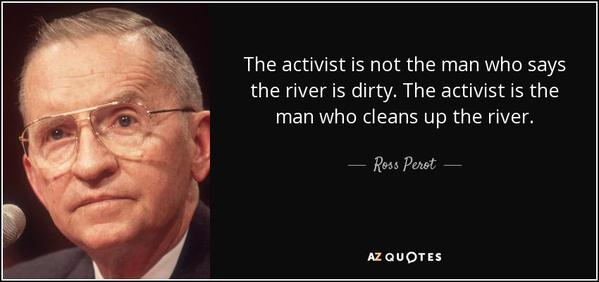There have been calls for a new form of activism - something that involves more than retweeting or digitally signing a petition at change.org - but the solution may instead be ramping up the shock value higher. The activists behind the 'ocean full of plastic' campaign against bottles and bags enjoyed the kind of popular success unseen since 1980s claims that America would overrun by garbage, with floating barges full of the stuff going up and down rivers. They used shocking images of young birds, poisoned by ingesting pieces of plastic and made it seem commonplace.
The mainstream public is certainly more skeptical, but then they always have been.

H/T Calestous Juma
Yet activists are not concerned about the mainstream public, they need to mobilize donors. And if they want to do it more cheaply, using online campaigns, they need to restore the trust in NGOs and government that groups like Natural Resources Defense Council have undermined: NRDC and Union of Concerned Scientists and others say science can't be trusted, and more top-down regulations are needed for government because government can't be trusted, companies can't be trusted - and anyone who defies that easy narrative is a corporate shill.
And people are too lazy to do the research because social media is about quick hits. A cursory look at all of the Einstein quotes on Facebook shows that social media is being manipulated by political, environmental and social activists and can't be trusted.
Instead, a new paper finds, a person is more likely to react positively to something like Charity Navigator than NRDC - because they have never heard of Charity Navigator and NRDC has a longstanding reputation for fabricating environmental claims and using their donations to plant stories in mainstream media.
High profile examples of the use of social media in humanitarian campaigns, such as One Billion Rising, Kony 2012, and the Enough Food for Everyone IF campaign, have drawn attention to the potential role of the Internet in enabling public mobilization and activism in response to suffering in other countries. However, little is known about the role of more everyday uses of the Internet in encouraging a sense of connection with, or awareness of, distant suffering.
The sample size in the paper was far too small to be considered valid, 52 UK internet users' online behavior over two months, but it merits consideration At one stage participants were asked to go online and find out more about an issue that interested them related to international development or developing countries - a task most failed to complete. They were then asked about their experiences during group discussions.
Users responded as expected - they ignored it. "My findings suggest that the internet is not a magic bullet for getting people engaged with or caring about humanitarian issues or crises," said Dr Scott, lecturer in Media and International Development at University of East Anglia's School of International Development.
'Distant suffering online: The unfortunate irony of cyber-utopian narratives' is published in the International Communication Gazette.






Comments